Mozambique: Venâncio Mondlane invited to Council of State; first meeting to be held on Tuesday, 24 ...
Watch: Filipe Nyusi meets Shinzo Abe in Kenya over Mozambique – Japan cooperation
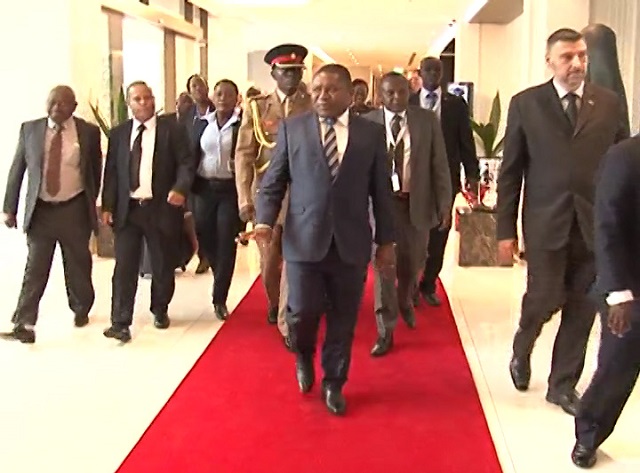
TVM
Mozambican President Filipe Nyusi arrived on Friday morning in Nairobi, where he will participate in the sixth edition of the Tokyo International Conference for African Development (TICAD VI), a two day event due to begin on Saturday.
Immediately after his arrival, Nyusi met with Japanese Prime Minister Shinzo Abe, one of the co-organisers of the event. The main item on the agenda of this meeting was strengthening the bilateral cooperation between Mozambique and Japan.
Speaking to AIM in Maputo on Wednesday, the resident representative of the Japanese International Cooperation Agency (JICA), Katsuyoshi Sudo, said “exports from Mozambique to Japan are around nine million US dollars a year, while Japan exports to Mozambique about 150 million dollars worth of goods a year”.
Japan is also involved in several major development projects in Mozambique. These include the rehabilitation of the Nacala rail corridor in the north of the country, budgeted at 700 million dollars, and the construction of a new thermal power station in Maputo. The latter should be completed in early 2018, and represents an investment of 120 million dollars.
The Nairobi conference is being held under the motto “Advancing with the African Sustainable Development Agenda – TICAD Partnership for Prosperity”. This is the first time since TICAD was launched in 1993 that the conference has been held in Africa.
That decision was taken at TICAD V, held in the Japanese city of Yokohama, in June 2013. At the time it was agreed that the conference will be held every three years (instead of every five) and the venue will alternate between Japan and Africa.
This year’s TICAD will be attended by some 35 African heads of state, and will also include a sizeable Japanese business contingent and a business fair, as the focus of the conference shifts away from aid to business and investment.
Abe has established through his office a Conference on African Economic Strategy which acts as the co-ordinating mechanism for all ministries, thus emphasising that relations with Africa have a strong economic focus and are not solely defined by the Ministry of Foreign Affairs.
Parallel events will take place alongside TICAD, including the 25th summit of heads of state and government of the members of the African Peer Review Mechanism (APRM), to be held under the theme “Revitalising the APRM to Strengthen Governance in Africa”.
During this summit, Nyusi is due to present Mozambique’s second progress report. A statement from the Mozambican National APRM Secretariat said this report qualifies Mozambique “to join those countries that are positioned to embark on the second cycle of the APRM”.
Speaking to reporters in Nairobi on Friday, Leopoldo da Costa of the APRM Steering Committee said that the first APRM assessment of Mozambique was held in 2014, and “now it’s time for the second assessment which coincides with the end of the first assessment cycle”.
He believed that, “faced with the range of problems raised and the recommendations made to the government, the assessment is highly positive”. He claimed there had been “great advances” in the economy, in education, health and agriculture.
“As for political activity, as you know, we had municipal elections which took place within the planned timetable (in 2013), as did the general elections (in 2014)”, said Costa. “So far everything that was planned has taken place in a satisfactory manner”.
This remarkably rosy view fails to note that the main opposition party, the rebel movement Renamo, relaunched its insurrection in February this year, ambushing vehicles on main roads in the central provinces, and attacking targets such as police stations and health units.
As for the economy the pace of growth has slowed this year, while annual inflation has risen to over 20 per cent. Financial assistance from key partners, including the International Monetary Fund (IMF) and the World Bank has at a standstill because of undisclosed government guaranteed loans, contracted under Nyusi’s predecessor, Armando Guebuza, in 2013-14, which only became public knowledge in April this year.
The APRM is a voluntary instrument acceded to by members of the African Union intended to encourage conformity in regard to political, economic and corporate governance values, codes and standards.
35 AU member states have acceded to the APRM, of whom 17 have completed their first assessment.


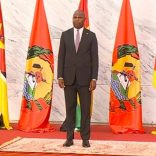
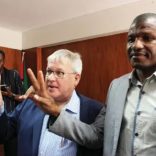
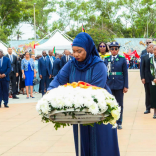


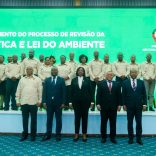




Leave a Reply
Be the First to Comment!
You must be logged in to post a comment.
You must be logged in to post a comment.